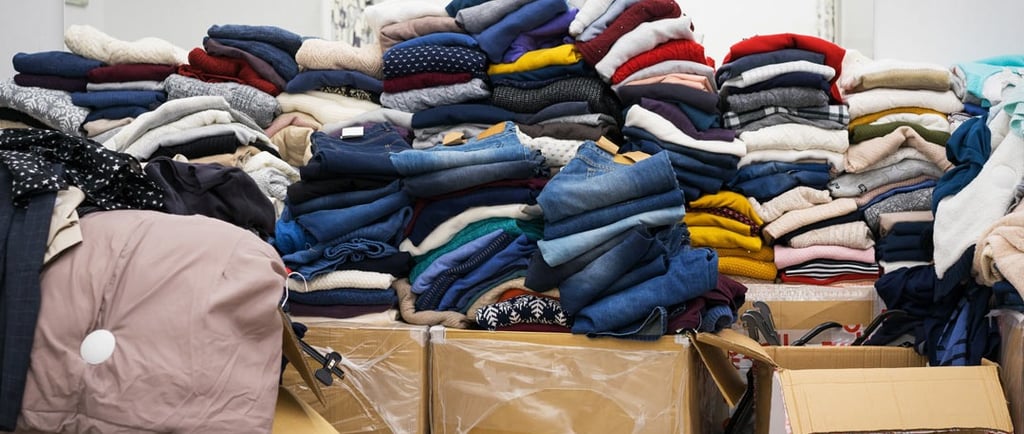Finding Reliable Suppliers: Questions to Ask and Red Flags to Watch For
In the fast-paced world of second-hand wholesale clothing, finding reliable suppliers is crucial. Whether you run a boutique thrift shop or a larger resale business, the quality and dependability of your suppliers can make or break your success. Here's a detailed guide on how to identify trustworthy suppliers and avoid common pitfalls.
Ema Kyabi
7/26/20243 min read


Questions to Ask Potential Suppliers
When evaluating potential suppliers, asking the right questions can provide vital insights into their reliability and suitability for your business. Here's a checklist to help guide your conversations:
What is your sourcing process?
Understanding where and how suppliers source their clothing ensures the items' authenticity and quality. Ask if they source directly from brands, retailers, or individual sellers, and how they verify the authenticity and quality of their items.
Can you provide references or testimonials from other clients?
References can validate the supplier’s reliability and product quality. Ask if you can contact any of their current clients directly or if they can share case studies or success stories.
What are your minimum order quantities (MOQs)?
Knowing the MOQs helps you understand if the supplier can accommodate your purchasing needs. Inquire if there are discounts for larger orders or if MOQs can be adjusted for long-term partners.
Do you offer samples?
Samples allow you to inspect the quality before committing to a large order. Ask if there is a cost for samples and how soon they can provide them.
What are your payment terms?
Clear payment terms help manage cash flow and prevent unexpected financial strain. Find out if they offer any financing options or discounts for early payments.
How do you handle returns and refunds?
A transparent return policy is crucial for resolving any issues with the products you receive. Ask about the time frame for returns and if there are any restocking fees.
What shipping methods do you use, and what are the associated costs?
Understanding shipping logistics helps you estimate total costs and delivery times. Inquire if they offer expedited shipping and if you can track your shipments.
Can you provide quality assurance certifications or reports?
Quality certifications indicate a supplier’s commitment to maintaining high standards. Ask how often they conduct quality checks and if you can see a sample report.
How do you stay updated with current fashion trends?
Ensuring your supplier is trend-savvy helps you stock items that appeal to fashion-conscious customers. Ask if they have a fashion expert on their team and how often they update their inventory with new trends.
What measures do you take to ensure ethical and sustainable practices?
Ethical and sustainable practices enhance your brand’s reputation and appeal to environmentally conscious consumers. Ask for details on their supply chain and if they have any sustainability certifications.
Red Flags to Watch For
Spotting red flags early can save you from potential headaches and financial losses. Here are key indicators that a supplier might not be trustworthy:
Lack of Transparency:
If a supplier is evasive about their sourcing methods, client references, or quality control processes, be cautious. Transparency is critical for trust.
Inconsistent Communication:
Difficulty in getting timely responses or clear answers is a major red flag. Reliable suppliers should be easily reachable and communicative.
Unrealistic Prices:
Prices significantly lower than the market average could indicate poor quality or even fraudulent activity.
Negative Reviews:
Consistently negative feedback from other businesses can signal reliability issues and potential problems with product quality or delivery.
Pressure Tactics:
Be wary of suppliers who use high-pressure sales tactics to push you into quick decisions. Reliable suppliers should give you time to make informed choices.
No Physical Address:
A legitimate business should have a verifiable physical address. A lack of this information can be a sign of a scam.
Poor Quality Samples:
If the samples provided do not meet your standards, it’s unlikely that bulk orders will be any better.
Complicated Return Policies:
A complex or non-existent return policy can make it difficult to address any issues with the products you receive.
Conducting Due Diligence
Thorough due diligence is essential when establishing new supplier relationships. Here's how to go about it:
Research Online:
Look for reviews, ratings, and news about the supplier on platforms like Trustpilot, BBB, or industry-specific forums. Gather unbiased information about their reputation and reliability.
Request Documentation:
Ask for business licenses, quality assurance certificates, and other relevant documentation to verify their legitimacy and commitment to quality standards.
Visit Their Facilities:
If possible, visit the supplier’s facilities to get a firsthand look at their operations and quality control measures.
Verify References:
Follow up with the references provided to get a better understanding of their experiences with the supplier.
Check Their Digital Presence:
Review their website, social media, and online activity to ensure they have a professional online presence and are engaged in their industry.
Start Small:
Begin with a small order to test the waters before committing to larger purchases. This allows you to evaluate the supplier’s product quality, delivery times, and overall service without significant financial risk.
Conclusion
Finding a reliable supplier is a cornerstone of a successful second-hand clothing business. By asking the right questions, staying vigilant for red flags, and conducting thorough due diligence, you can build strong partnerships that support your business goals. At Vintador, we pride ourselves on transparency, quality, and customer satisfaction, ensuring you receive only the best for your business. Remember, a good supplier relationship is built on trust, communication, and mutual benefit.
By following these guidelines, you can confidently navigate the supplier landscape and secure the best products for your customers. Here’s to profitable partnerships and a thriving business!
